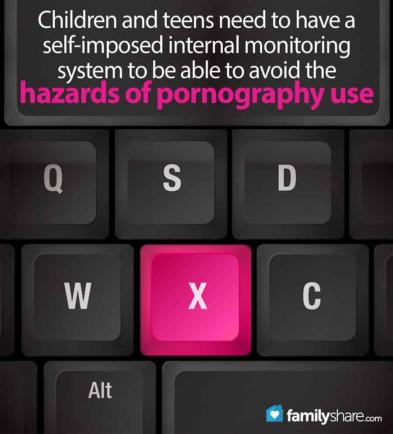
Parents consider protecting their children from harm as one of their top responsibilities. The average age of first exposure to pornography is 9 years old. Parents need to understand that it is not possible to fully protect children from exposure to pornography. It is possible to diminish the exposure, and to prepare children to understand and talk about their exposure to pornography when it happens.
External monitoring
External monitoring has to do with identifying possible ways your child could be exposed to pornography and finding ways to decrease the chance of exposure. Exposure to pornography can happen through the Internet, computer games, cell phones, advertisements, and family and friends.
-
All computers in your house, including laptops, should have an Internet filter installed which blocks websites that carry pornography. Make sure kids know what to do if a pornographic image accidentally pops up. Teach them to how to do an emergency screen crash and then immediately talk to a parent. As a parent, be prepared to "debrief"� the event.
-
TV shows, video and computer games and other recreation should be monitored.
-
Children's cell phones should be gathered up at night to be recharged by a parent, rather than kept in the child's bedroom.
-
Know how to check which Internet sites have been accessed on the computers in your house. If your child has a cell phone, check on texts, photos, and Internet access.
Internal monitoring
External monitoring will not be sufficient to protect children from pornography. Just as parents need to install filters on computers and phones, they need to help their children install a strong internal monitoring system. Children and teens need to have a self-imposed internal monitoring system to be able to avoid the hazards of pornography use.
-
Children need to understand what healthy sexuality is and why it is so important. They need to know the difference between healthy and unhealthy sexuality and what a healthy relationship looks like.
-
Know the answers about why pornography use is so damaging so that your discussions with your children go beyond, "Pornography is bad, don't look at it!"�
-
You can start a discussion about pornography by talking about something you've read, a question you have, or something as straightforward as, "I remember the first time I saw pornography,"� then tell your story and ask your child to tell you about their exposure.
-
Have regular discussions with your children and teens about their experiences with pornography. One family started having a monthly "Warrior's Counsel" where children (and parents) talked about things such as bullying, bad language, pornography exposure, and vicious gossip to which they have been exposed. The family brainstormed on why these things were harmful and how to avoid or prevent such things, in the future.
At what age do conversations with my child need to start?
-
Some statistics indicate that the average age of exposure to pornography for children is 9 years of age. Many people have introduced conversations as early as the age of eight.
-
The majority of teens, ages 16 and older, have been exposed to hard core pornography. You should be engaging in regular discussions with your teen about what they're seeing and how they are dealing with it.
-
Many parents are concerned that discussing sexual topics plainly and boldly might trigger curiosity. Various social science studies show, however, that when parents openly discuss sexual topics in an age-appropriate way, youth are less likely to experiment and more likely to remain abstinent.
What do I need to teach my children and teens about Internet use?
-
Instruct family members to tell a parent if they encounter any form of pornography while on the computer. This will help reduce the fear or shame of accidental exposure. It also serves to open discussions about the dangers of pornography.
-
Teach family members to use the Internet for a specific purpose only. Aimless surfing makes it easier to wander across inappropriate sites.
-
Caution family members to avoid public chat rooms, bulletin boards, or unfamiliar areas on the Internet. Such sites present an unnecessary risk for children and adults.
-
Teach children not to share any personal information online without parental knowledge and permission. Many predators pose as children to gain access to information that may put children at risk.
-
Be aware of your children's school and public library policies are regarding Internet use and accessibility.
-
Warn family members never open email from someone they don't know.
FOR MORE HELP AND SUPPORT
Read
Dr. Jill C. Manning's book, What's the Big Deal About Pornography? (Shadow Mountain Press, Salt Lake City, UT. 2008).

